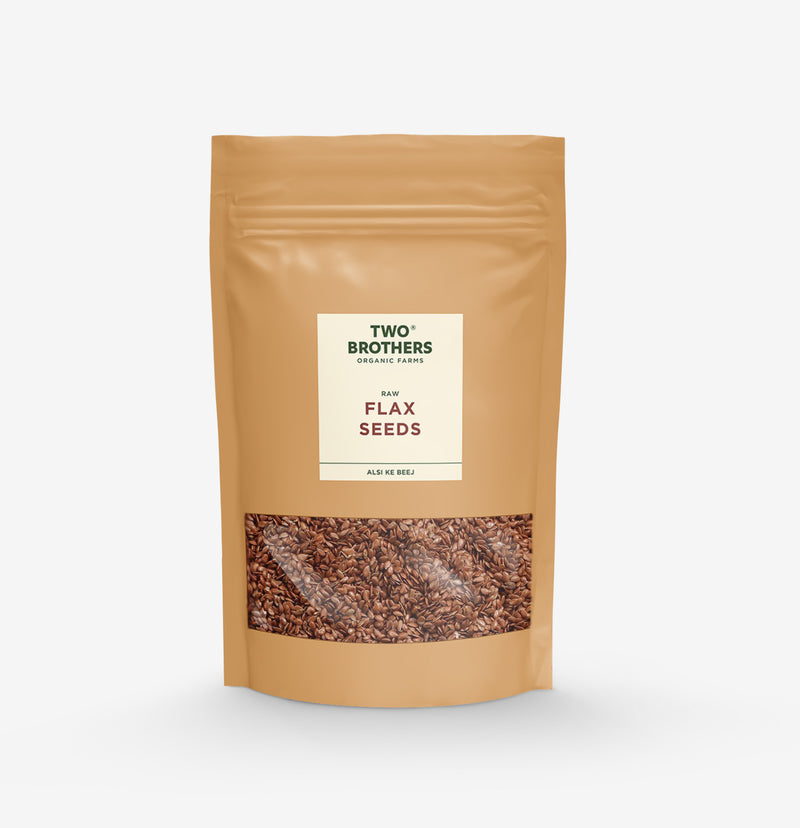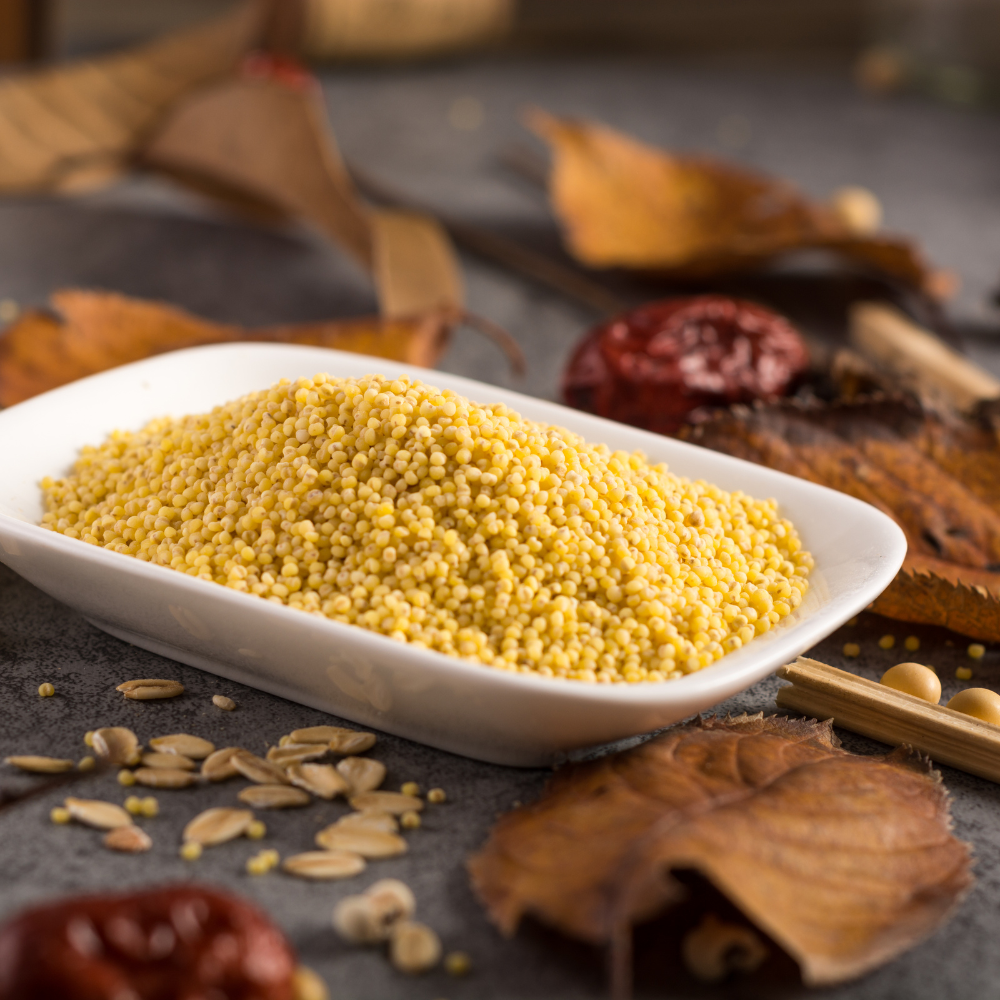Flax seeds, also known as alsi, have long been recognised for their exceptional health benefits and nutritional value. Packed with essential nutrients, these tiny powerhouses have been consumed for ages in India and eastern Mediterranean regions. From promoting heart health to aiding digestion, flax seeds offer many advantages that make them a valuable addition to any diet.
In this article, we will delve into the numerous benefits of flax seeds, exploring their impact on your overall well-being and providing insights into how to incorporate them into your daily routine for optimal health outcomes.

- Sprinkle on Oats: If you have whole flax seeds, crush them in a grinder and sprinkle them on your oatmeal for a nice little tasty treat in the morning.
- Mix Into Yoghurt: Like oatmeal, you can mix ground flax seeds into yoghurt for added benefits.
- Use for Garnishing: Speaking of ground flax seeds, you can even use them as elements of garnishing for fresh fruits, smoothies, and even avocado toasts.
- Add in Baking: If you are into baking delicious treats, you can experiment with it and add some ground flax seeds into cookies, pancake batter, brownies, muffins, and banana bread.
- Mix with Roti: Another way to take advantage of eating flax seeds is by mixing them into your roti flour for added benefits.
What are the Side Effects of Flax Seeds?
While there are tons of benefits to eating flax seeds, there are some downsides to consuming them. Some individuals may find themselves allergic to flax seeds, but this is not common. Ground flax seeds are incredibly great for increasing fibre intake, but consume them in limited quantities as excess fibre may lead to digestive problems like bloating or gas.
Flax Seed Nutritional Facts
There are several benefits of eating flax seeds. But before we dive into them, let's take a look at the nutritional value this powerhouse of nutrition provides:
Seven grams or one tablespoon of flax seeds contains the following nutritional value:
|
Calories |
37 |
|
Carbs |
2 gms |
|
Fat |
3 gms |
|
Fibre |
2 gms |
|
Protein |
1.3 gms |
|
Thiamine |
10% of the Daily Value |
|
Copper |
9% of the Daily Value |
|
Manganese |
8% of the Daily Value |
|
Magnesium |
7% of the Daily Value |
|
Phosphorus |
4% of the Daily Value |
|
Selenium |
3% of the Daily Value |
|
Zinc |
3% of the Daily Value |
|
Vitamin B6 |
2% of the Daily Value |
|
Iron |
2% of the Daily Value |
|
Folate |
2% of the Daily Value |
Health Benefits of Flax Seeds
Flax seeds come with plenty of health benefits. Below are some of the best-known benefits of eating flax seeds:
1. Aids Digestion
The first benefit of eating flax seeds is their ability to aid digestion. Flax seeds contain both soluble and insoluble fibre. Soluble fibre helps your digestion to slow down, reducing blood sugar and cholesterol. This improves your body's blood glucose levels. Insoluble fibre aids in absorbing water and bulking your stools, preventing constipation.
Flax seeds come with plenty of health benefits. Below are some of the best-known benefits of eating flax seeds:
2. Reduces Inflammation
Flax seeds are high in ALA (alpha-linolenic acid), a type of omega-3 fatty acid. ALA is fundamentally found in plant foods and is extremely important for cardiovascular health. A study suggests that ALA may help prevent cholesterol deposition in heart vessels and reduce inflammation. This essential omega-3 fatty acid is extremely important for your heart health, and since your body cannot naturally produce it, flax seeds can be an excellent source.
3. Decreases Risk of Cancer
Lignans are plant compounds that may contain cancer-fighting properties. One of the major benefits of eating flax seeds is that it is rich in lignans, containing approximately 75 to 800 times more flax seeds than plant foods. And some studies even suggest that flax seeds may have a critical role in decreasing the risk of breast cancer in postmenopausal women.
4. Boosts Immunity
Another benefit of eating flax seeds is that the protein in these seeds contains amino acids, such as glutamic acid, aspartic, and arginine, that are known to fight fungal and other infections in the body. This improves your immunity and gives your body the strength to fight against illnesses.
5. Promotes Weight Loss
Alsi seed benefits also include weight management. The presence of soluble fibre in flax seeds slows down your body's digestion process, making you feel satiated for longer. This reduces hunger, further decreasing your food intake and calories. Hence, aiding in your weight loss journey. Further, what enhances the benefits of eating flax seeds for weight loss is that they are low in calories. So, you will feel full for longer and won’t increase your total daily calorie consumption.
6. Reduces Blood Pressure
Another essential flax seeds benefit is its ability to control blood pressure in patients with hypertension. A study conducted found that flax seeds may lower diastolic and systolic levels, which may result in lower blood pressure among patients with hypertension.
7. Stabilises Blood Sugar
According to a review of 25 studies in PubMed, flax seeds may help decrease your blood sugar levels and prevent insulin resistance. When there's insulin resistance, your body cannot regulate blood sugar levels, but flax seeds may benefit you by regulating your blood sugar levels. This blood-sugar-lowering possibility in flax seeds may be due to the presence of soluble fibre since soluble fibre slows down the sugar absorption process in the blood, reducing blood sugar levels in your body. But you need to remember that this is not an alsi seed oil benefit, but you can enjoy this benefit only by consuming whole flax seeds. This happens because alsi oil is void of fibre.
8. Supports Healthy Hair and Skin
Eating flax seeds can benefit your skin and hair as well because they are a rich source of essential nutrients needed for healthier skin and hair. One of the main benefits of flax seeds for the skin is the presence of ALA which may help maintain your skin's health by improving skin hydration, reducing oil production, and reducing inflammation for more supple and smoother skin. Another benefit of flax seeds for the skin is that they are rich in antioxidants like lignans. According to a study in the Journal of Clinical and Aesthetic Dermatology in 2012, lignans have potential benefits on your skin as they are rich in antioxidant and anti-inflammatory properties, protecting the skin.
Further, the ALA in flax seeds also benefits your hair. Omega-3 fatty acids are essential for maintaining scalp health, promoting hair growth, and preventing dry and brittle hair. They also have anti-inflammatory properties that may help reduce scalp inflammation, which can contribute to hair loss. Additionally, flax seeds contain enough protein required for healthy hair growth.
9. Doesn’t Contain Gluten
Flax seeds are an excellent alternative for grains containing gluten, like wheat. People who are gluten intolerant or have celiac disease can consume flax seeds and take advantage of its benefits. They are considered a great gluten-free alternative for consuming omega-3 fats and fibre in your body.
How to Eat Flax Seeds
While there are several benefits of flax seeds, how do you eat them? One of the best properties of these nutritional powerhouses is that they can be eaten in whatever form you want! Here are some best ways to eat them to optimise their benefits:










